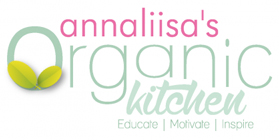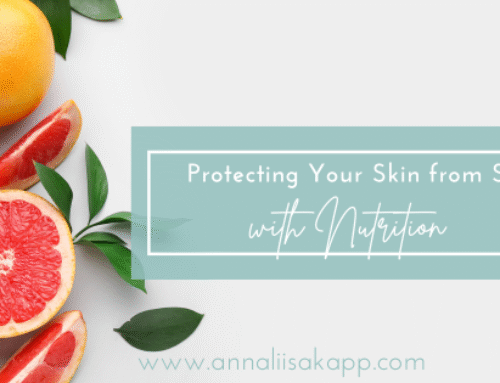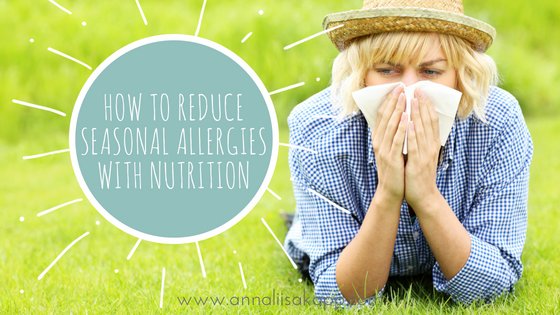
.
Seasonal allergies are the worst, aren’t they?
We wait for spring all winter long, and then when the weather is finally warm, out come the pollen and allergies galore.
And you may not even have the allergies, but perhaps your kids or spouse is suffering.
Seasonal allergies and hay fever are on the rise, mostly due to added stressors on the immune system due to greater chemical pollutants in the air, water, and food; earlier weaning and earlier introduction of solid food to infants; food additives and genetic manipulation of plants, resulting in food components with greater allergenic tendencies.
What’s happening to your body is similar to a extrinsic, or atopic, asthma, which is generally considered as an allergic condition with an increase in IgE – the allergic antibody. When exposed to an allergen, such as pollen from trees, weeds, and grass, it triggers a release chemicals that mediate (produce or control) inflammation from mast cells (specialized white blood cells). These include histamine and leaukotrienes, which stimulate the bronchial constriction and other symptoms of allergies like itchy and runny nose and eyes.
So what can we do to lessen the symptoms?
While it may be your new norm to suffer from seasonal allergies each year, there is always something we can do to improve the symptoms. Building up the immune system and lessening the load on the body when it comes to triggers associated with our environment, food intake, and resilience to stress will greatly impact how your body reacts to seasonal allergies.
In this article I will go through various food, vitamin, superfood, herbal and lifestyle suggestions to improve seasonal allergy and atopic asthma symptoms. Remember to check with your physician before starting any new supplements or dietary recommendations.
.
Reducing Allergens in Your Home
Firstly, it’s important to lessen to allergenic load. Lets start with your home!
Allergens like dust, pollen and dander can hide in many places in your home – especially those shaggy carpets that are hard to clean. If you’re really suffering, I would suggest getting rid of as much carpeting in your home as you can and replacing the filter on your vacuum when needed. And don’t forget to vacuum upholstered furniture and fluff those throws and pretty pillows outside!
You can even sprinkle a mix of baking soda and tea tree oil onto your furniture, carpet, and mattress and vacuum it up to remove hidden allergens.
One thing I always recommend to clients is to invest in HEPA filters, which can either be attached to your central heating and air conditioning system or just a small portable filter for your bedroom and or living room. You can purchase these online, or places like Canadian Tire or Home Depot.
While opening the windows to your home is a great idea, you may want to keep them closed in the early morning from 5-10am, when pollen is at it’s peak.

.
Nutritional Therapy Considerations
Increase Your Omega 3 Fatty Acids
The over consumption of arachidonic acid (derived from animal products like butter and meat, and peanuts) can alter the prostaglandin metabolism and increase inflammation, whereas omega 3 fatty acids from EPA (eicosapentaenoic acid) and DHA (docosahexanoic acid) reduces inflammation, asthma, and allergies. Since it takes time to make the shift on a cellular levels, taking an omega 3 fatty acid for a year may be necessary to see results where there is a lot of inflammation.
Action step:
Try eating cold water fish (wild salmon, mackarel, sardines) twice a week and taking a high quality fish oil supplement.
.
Add in the Antioxidants
The top antioxidant vitamins and minerals to support the immune system response are flavanoids (like quercetin), vitamin A, C, E, Zinc, Selenium and Copper. These antioxidants are thought to provide protection for the lungs, as free radicals can both stimulate bronchial constriction and increase reactivity to other agents.
Flavanoids especially helpful for allergies can be found in extracts of grape seed, pine bark, green tea, and Ginkgo biloba.
Action step:
Eat a variety of high antioxidant fruits and vegetables at all meals, particularly foods like kale, sunflower sprouts, avocado, spinach, and asparagus. Top nuts and seeds rich in antioxidants include sesame, sunflower and pumpkin seeds, almonds and Brazil nuts. You can also try having a green supplement, like Genuine Health Greens+ products, which have the above mentioned flavanoids included in the formula. My favourite is the Whole Body Nutrition. Taking a supplemental form of Quercetin (400mg) twenty minutes before a meal can also be helpful.
.
Vitamin C to the Rescue
During allergy season, I always recommend taking extra vitamin C throughout the day. Vitamin C is especially important to the health of the lungs, as it is the major antioxidant present in the lining of the airway surfaces. Studies show that there is a significant improvement in asthma patients with taking 1-2 grams daily, and higher doses can help to reduce histamine levels. Vitamin C not only prevents the secretion of histamine, but it also helps to detoxify histamine from the body.
Action Step:
Vitamin c is a water soluble vitamin that gets depleted quickly from foods and the body, especially during times of stress or illness. Foods rich in vitamin C include cabbage, berries, kiwi, camu camu, and bell peppers. Try taking a high quality vitamin C supplement at 1000 mg 3x per day when your allergies are acting up. I like to use the Buffered Vitamin C formula by Thorne Research because it’s hypoallergenic and easily absorbed.
.
B12 for Sulfite Sufferers
If you tend to really get stuffed up after ingesting sulfites, either naturally occurring ones in food, wine, and beer or extra additives, you might benefit from vitamin B12. You can take 1 – 4 mcg before ingesting sulfites to lessen the effect.
Action Step:
Take a vitamin B12 supplement before eating foods rich in sulfites, or eat 3 oz of sardines (which has 8mcg of B12) or 4oz of wild salmon (which has 5mcg of B12)
.
Eat More Garlic and Onions
Onions and garlic, which are part of the Allium family, can inhibit inflammatory response caused by allergen-inhalation challenges. Onions contain quercetin and isothiocyanates, which may inhibit the biosynthesis of arachidonic acid (which if you remember is found in animal meats and products, as well as peanuts).
Action Step:
Use garlic and onion in your meals daily in sauces, salad dressings, salads, and soups.
.
Superfoods and Herbs for Allergies
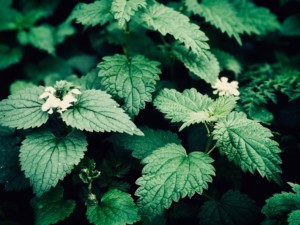
Stinging Nettle, which you can purchase in either capsule, herbal tea, or tincture form, is also great to have during the allergy season. Not only does it cleanse the blood and support your body with minerals for energy, it helps to alleviate the symptoms of allergies as it inhibited pro-inflammatory pathways related to allergic rhinitis by antagonizing histamine 1 receptor, inhibiting prostaglandin (PG) formation and inhibiting degranulation. Try drinking a cup of stinging nettle tea daily during allergy seasons.
.
Spirulina consumption significantly improved the symptoms, including nasal discharge, sneezing, nasal congestion, and itching, compared with placebo in a double-blind, placebo-controlled study to evaluate the effectiveness and tolerability of Spirulina in patients with allergic rhinitis. You about 1 tsp daily.
.
Bee pollen is a great addition to your morning smoothie or yogurt bowl – this study suggests that the flavonoid myricetin may have some anti-allergic effects. Use about 1 tsp daily.
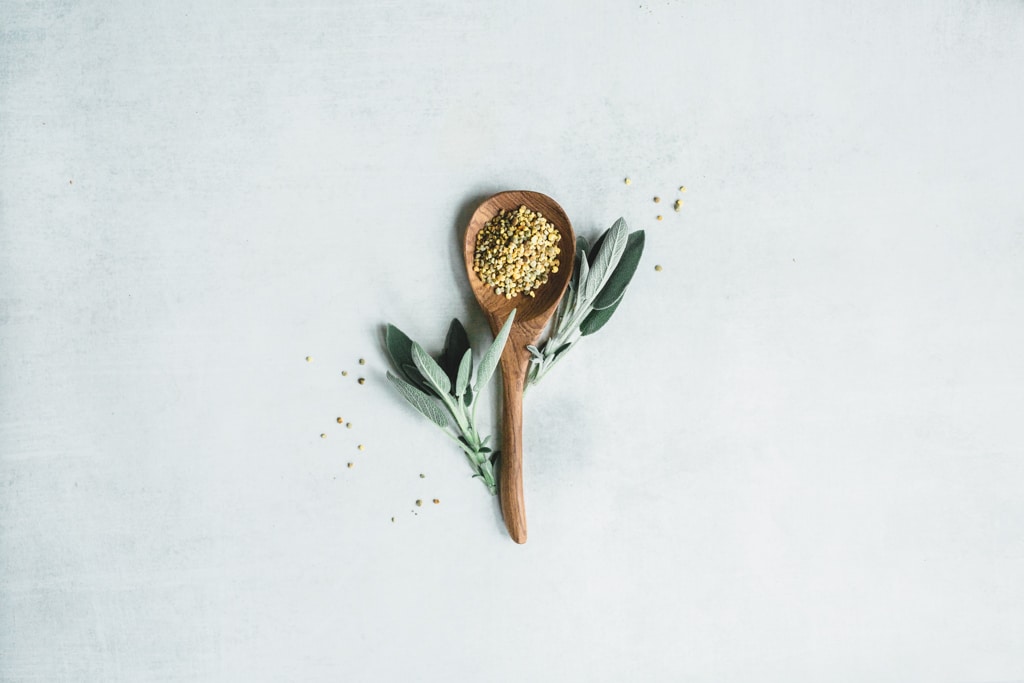
Photo Credit: Wellness Stock Shop
.
.Support Your Gut Health
When it comes down to it, there really isn’t a condition that can’t be improved by supporting the digestive system. Especially when it comes to our immune system as 70-80% of the immune system is within the digestive tract. You’ll want to start by removing some of the food allergens, especially eggs, fish, shellfish, nuts, and peanuts, and then adding in supportive nutrients like:
Probiotics – healthy live bacteria found in foods like miso, kombucha, kefir, raw unpasteurized sauerkraut
Prebiotics -inulin/oligosaccharide rich soluble fibre found in foods like onions, Jerusalem Artichokes, leeks, asparagus, and dandelion greens. This is fuel for your healthy gut microflora.
Bone broth – rich in gut healing nutrients like Glucosamine, Hyaluronic Acid, minerals and electrolytes and collagen.
Check out this Gut Thriving Soup Recipe with Leek + Bok Choy and Miso
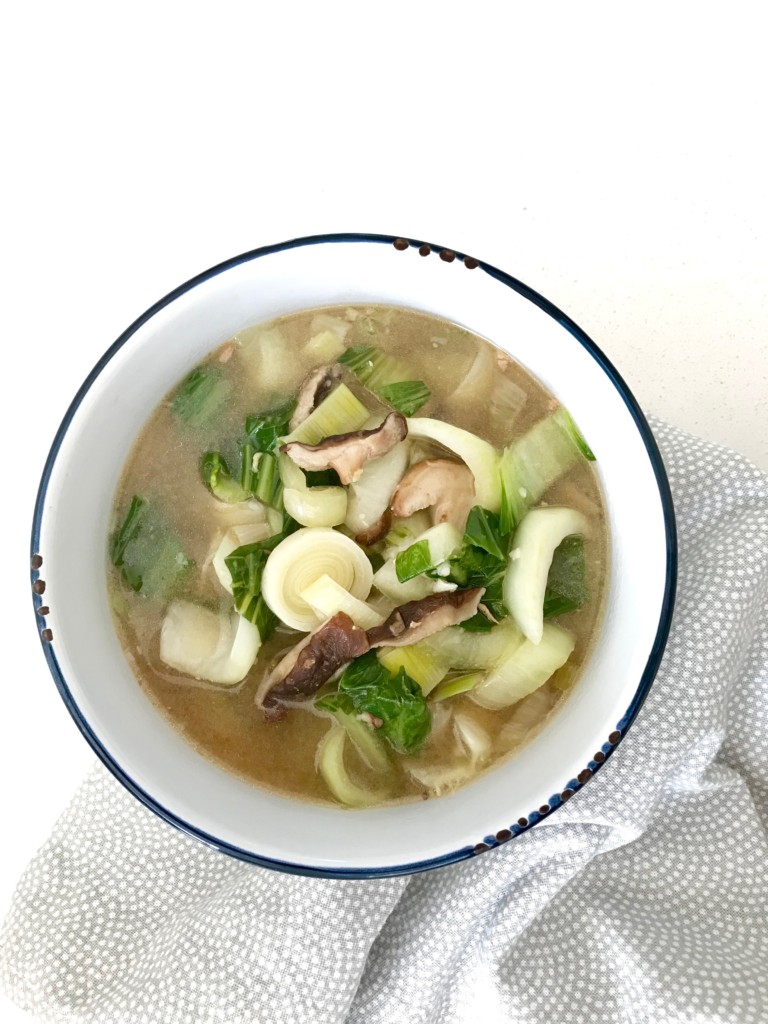
.
Watch Your Food Additive Intake
Food colourings, most commonly tartrazine (orange), sunset yellow, amaranth (red), coccine (red), and pate blue, have been shown to cause allergenic reactions and asthma. Also look out for added sulfites – used as a food preservative in salads, dried fruits, and of course wine and beer!
Action step:
Read your labels – look out for additives (sometimes numbers are used instead of actual names for food additives or the numbering system used by the European Union (e.g., E 102). These are not acceptable alone as the common name declaration for the food additive in Canada, but are great for detecting food additives). Look for unsulfured dried fruit, and choose organic wine. Decanting your wine will also reduce the sulfites.
.
Further Steps
If you find that there is little relief for your allergies after trying many natural remedies, there might be underlying contributors at play.
For example, hidden food allergens, especially eggs, fish, shellfish, nuts, and peanuts.
A condition of hypochlorhydria, where the gastric acid secretions are below normal levels, can contribute food allergies. It can also have a major impact on the success of an elimination diet, and if not corrected, on the development of additional food allergies.
Food allergies can also contribute to a condition of leaky gut, or small intestine permeability, which means there is now an increased antigen load on the immune system. What this means is that the intestinal barrier, where most of your nutrient absorption takes place, becomes too leaky and large molecules that normally are not absorbed find their way into the bloodstream. This is where the immune system is becomes overwhelmed by the extra antigens, and increases the risk of developing more allergies and asthma. Finding a solution to your specific food allergens is essential to resolve the issue.
An overgrowth of Candida can also contribute to allergic reactions and asthma, as the candida yeast produces the acid protease, which is the allergen responsible for the reaction.
Decreased levels of the adrenal hormone DHEA (dehydroepiandrosterone) has been shown to be a common concern for postmenopausal women with allergies and asthma.
Action Step:
Take charge of your health by booking an appointment with the appropriate health care provider to help you figure out solutions to the underlying causes of your seasonal allergies. I can help you with finding solutions to what’s bothering you in a personalized 1:1 approach that fits your lifestyle. For Acupuncture Treatments, schedule your appointment here.
You can book a complimentary session with me to get started below.
Hope you enjoyed the article!
.
 If you are looking for more sustainable habits that don’t include an overnight diet, a fad, or magic pill, and you’re ready to transform your health and energy levels, you can start your journey by applying for a complimentary
If you are looking for more sustainable habits that don’t include an overnight diet, a fad, or magic pill, and you’re ready to transform your health and energy levels, you can start your journey by applying for a complimentary